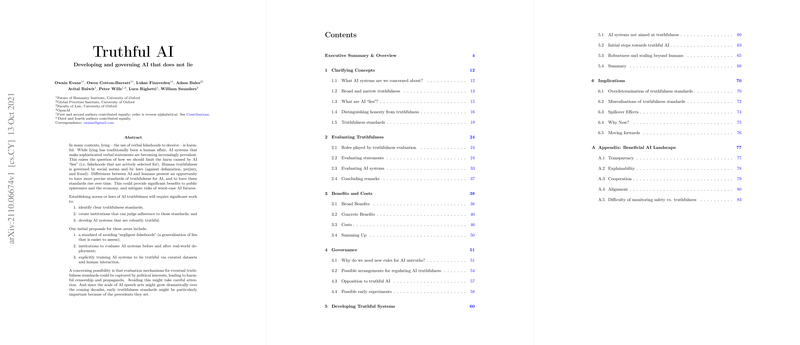Analyzing the Development and Governance of Truthful AI Systems
The paper "Truthful AI: Developing and Governing AI that does not lie," authored by researchers from the University of Oxford and OpenAI, presents a comprehensive examination of the need, challenges, and methodologies for developing AI systems focused on truthfulness. The paper explores the implications of AI truthfulness, proposing standards that could govern the behavior of AI systems to avoid generating falsehoods. This discussion is increasingly relevant as AI systems, like GPT-3, gain linguistic competence and influence.
Overview of AI Truthfulness Needs
AI systems that generate language and interact with humans or other systems present new challenges in truthfulness. While these systems can mimic human conversation, they may not inherently prioritize truth, which could lead to the dissemination of misleading or harmful information. The paper outlines the mechanisms by which humans regulate truth—laws, social norms, and market forces—and how these may not seamlessly apply to AI. AI systems after all, lack intent and moral culpability, prompting the creation of new standards.
Designing Truthful AI Systems
The paper proposes several methodologies to encourage AI truthfulness:
- LLMing Adjustments: Training AI systems on curated datasets that highlight factual accuracy, filtering out unreliable narratives could be foundational. Additionally, integrating retrieval mechanisms from trusted sources could mitigate false information propagation.
- Reinforcement Learning: Tailoring reinforcement learning to emphasize truthfulness, where feedback is centered around truth evaluations instead of engagement metrics, could foster more honest AI behavior.
- Transparency and Explainability: Enhancing systems' transparency by making their decision-making processes interpretable, possibly leveraging adversarial training and transparency tools, would ensure more trustworthy AI outcomes. Transparent AI could lead to more robust truthfulness and alignment with human values.
Governance Structures
The paper contemplates the governance structures that could enforce AI truthfulness standards. These include industry-led regulations, certification bodies, and legal frameworks. Such structures would need to assess AI systems' truthfulness pre- and post-deployment, potentially using automated and human evaluations.
Potential Challenges and Considerations
Developing truthful AI standards comes with its set of challenges. A primary concern is the potential misuse or political capture of truth-determining bodies, leading to biased or censored AI systems. Safeguards would be crucial to maintain independence and scalability of truthfulness across various domains.
The cost of such compliance and the practicality of enforcing these truthfulness standards is also a considerable hurdle. However, the potential for AI to mislead on a massive scale justifies the need for foundational truthfulness principles.
Implications for Future AI Development
Ultimately, the paper suggests that fostering truthful AI systems produces societal benefits, including increased trust and reliability in AI technologies. This trust can drive economic growth through improved decision-making, reduced deception, and enhanced cooperation. Aligning AI truthfulness with transparency and AI alignment research could further programmatically secure AI's alignment with human interests, reducing existential risks.
The paper underscores the urgency and importance of exploring these domains, reasoning that optimal and scalable solutions may have far-reaching impacts as AI continues to evolve, potentially influencing a majority of human communication. The research not only addresses practical implementation but also lays the groundwork for philosophical and ethical considerations in the design of advanced AI systems that are genuinely aligned with human values.
